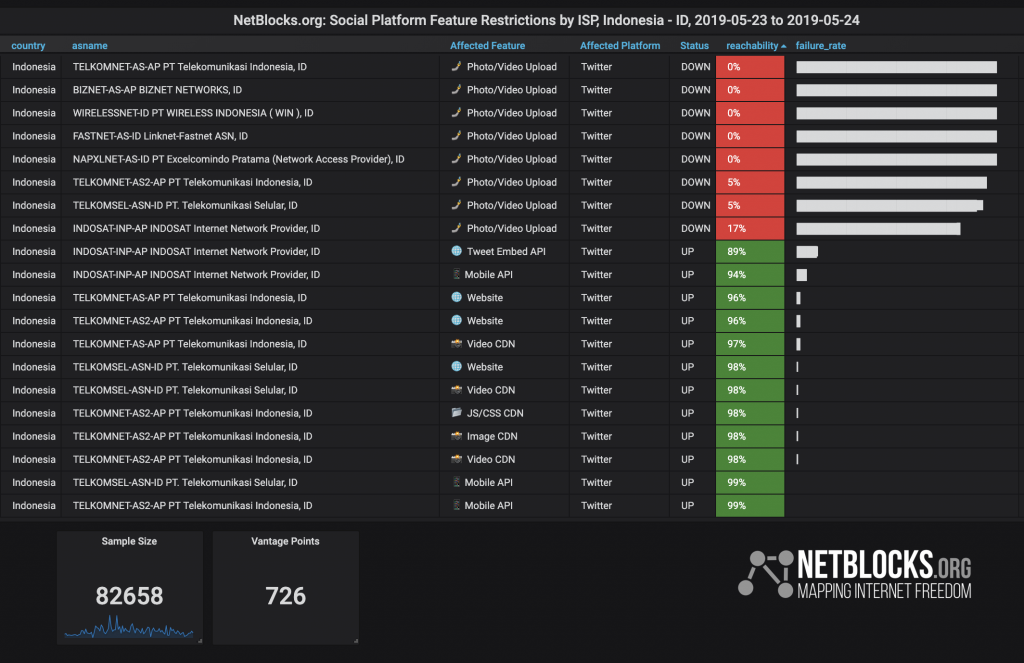Real-time network data from the NetBlocks observatory confirm that Indonesian internet providers are targeting and disabling specific social media features including Twitter photograph and video uploads, with evidence of a sophisticated internet censorship filtering regime now in place nationwide.
Backend servers for each of the social and messaging platforms were partially blocked in Indonesia as of Wednesday 22 May 2019 after authorities ordered a social media blackout amid an escalation of election protests. The restrictions are now entering their third day and users have continued to report social media “throttling,” or a perception slowed-down connectivity when using social and messaging apps.
Confirmed: #Indonesia has deployed a sophisticated selective internet filtering scheme to restrict Twitter photo and video uploads; nationwide social media blockade also affecting Facebook, WhatsApp, Instagram, Telegram now entering third day #KeepItOn ?https://t.co/mjfA7hs7ej pic.twitter.com/DzIdCzPz5b
— NetBlocks (@netblocks) May 24, 2019
80,000 network measurements taken from over 700 vantage points across Indonesia now provide conclusive evidence of the mechanism, scope and extent of filtering deployed by the country’s internet providers to target Twitter image and video upload features, in addition to Facebook, Instagram, WhatsApp and Telegram services.
Study results show that photo and video uploads are blocked, while API, backend, while basic features have been intentionally left functional. NetBlocks data show that internet providers Telkom, XL Axiata Tbk (formerly PT Excelcomindo Pratama Tbk) and Indosat are among a set of ISPs that have opted for selective filtering, which allows Twitter to continue functioning while preventing users from uploading or sending their own photographs and videos.
Update: Access to the services has been restored as of 7:00 a.m. UTC 25 May 2019:
Confirmed: #Indonesia has lifted Twitter, WhatsApp, Facebook and Telegram restrictions which targeted image and video sharing features as of 7:00 a.m. UTC this morning; incident duration 3 days #KeepItOn ?https://t.co/mjfA7hs7ej pic.twitter.com/pSIza993B3
— NetBlocks (@netblocks) May 25, 2019
Authorities tend to implement total platforms blocks as was the case in Sri Lanka earlier this month following a series of deadly terror attacks. Indonesia’s selective technique is not without drawbacks — it will prevent publication of genuine, authentic footage from the scene of demonstrations while doing little to prevent the circulation of existing disinformation campaigns.
Update: Social media restrictions in #Indonesia now extend to most major internet service providers as authorities attempt to quell election unrest; network data shows targeting of CDN servers used to share images and videos #KeepItOn ?https://t.co/HeqF4s0vuT pic.twitter.com/RaVDjjsMFi
— NetBlocks (@netblocks) May 22, 2019
Primary websites belonging to some of the services remain reachable according network data. Facebook backend servers used by Facebook Messenger and Instagram appear among those affected as well as those used by WhatsApp and Twitter, limiting image and video sharing features. Telegram includes censorship circumvention measures although users also report having difficulty with it too.
In order to diagnose Indonesia’s selective social media blocks, NetBlocks’ web probe methodology was enhanced over the course of two days to add a breakdown of impact by social media platform feature — CDN availability, video and image CDN availability, upload servers, streaming servers, app backend and third-party API endpoints as well as website hosts and web and desktop editions of messaging apps.
Findings are drawn from a set of internet performance measurements collected from across Indonesia in addition to a larger global control data set, providing a representative view of network performance and service reachability via multiple internet service providers.
Each NetBlocks web probe measurement consists of latency round trip, outage type and autonomous system identity aggregated in real-time to assess service availability and performance in a given country.
Methodology
This report follows the NetBlocks Election Pathfinder Rapid Response methodology which defines a set of core principles, workflows and benchmarks for network measurement and evaluation during elections and referenda.
Internet performance and service reachability are determined via NetBlocks web probe privacy-preserving analytics. Each measurement consists of latency round trip time, outage type and autonomous system number aggregated in real-time to assess service availability and latency in a given country. Network providers and locations are enumerated as vantage point pairs. The root cause of a service outage may be additionally corroborated by means of traffic analysis and manual testing as detailed in the report.
NetBlocks is an internet monitor working at the intersection of digital rights, cyber-security and internet governance. Independent and non-partisan, NetBlocks strives to deliver a fair and inclusive digital future for all.
[ press | contact ] Graphics and visualizations are provided for fair use in unaltered form reflecting the meaning and intent in which they were published, with clear credit and source attribution to NetBlocks. Intellectual property rights are protected including but not limited to key findings, facts and figures, trademarks, copyrights, and original reporting, are held by NetBlocks. Citation and source attribution are required at the point of use.

